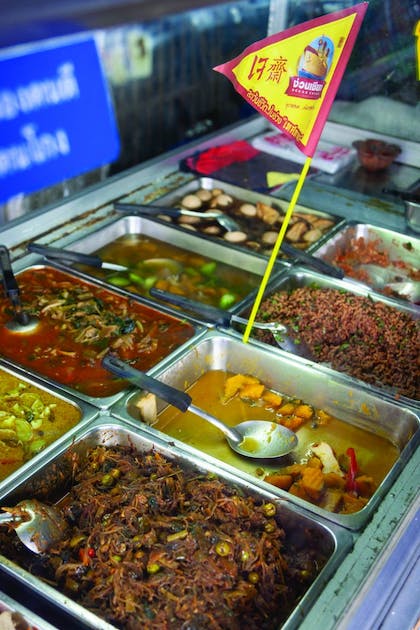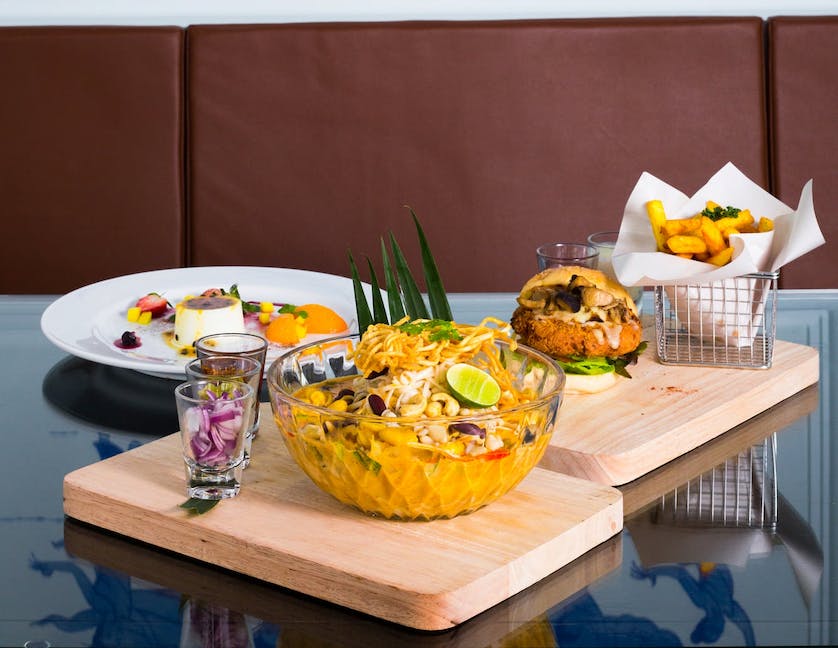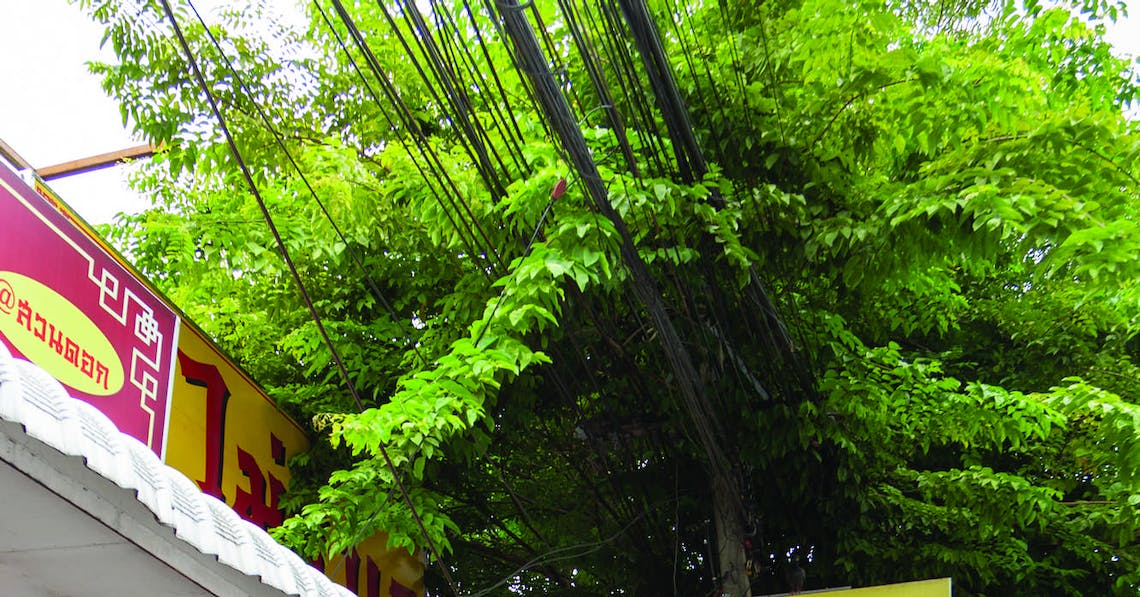There are many reasons why one would decide to make a commitment to veganism. Some do so for ethical reasons, believing that animals should not be killed for food while others do so for health reasons. Since 51% of global greenhouse gasses come from animal agriculture, according to Worldwatch Institute, many have spurned meat for the sake of the environment, while some do so because of religion.
Over the last decade or so, vegan and vegetarian trends have swept across the West. Every café has vegan options, every supermarket stocks vegan friendly products. It has become part of the psyche, and guests to a dinner party or barbeque are routinely asked the question, “Do you have any dietary requirements?”
Asia’s love of meat has still to wane. Yet veganism is nothing new to the East, having existed in many forms, growing out of Buddhism, Hinduism and Jainism over the millennia. In spite of the never ending conveyor belt of meat products in Thailand, many Thais regularly enjoy vegan meals and the lack of meat doesn’t seem to cause much of an issue, especially when a fair number of the population goes without for three months per year during lent.
Anyone who has lived in Thailand for some time will know the word ‘jay’ which is used to describe veganism. What may not be commonly understood is that jay has a very different meaning from veganism — coming with different rules, beliefs and traditions. So, what is the difference? Are the reasons that people in the west choose to be vegan the same as in Thailand? Is Thailand changing its opinions on veganism because of Western influence? Or is the West finally catching up to the East’s long tradition of veganism? And, more importantly, why no garlic?!
Vegan or jay?
You may have noticed the yellow flags by roadside restaurants with the two red Thai letters on in that read Jay (เจ). In simple terms, this word means ‘vegan’ but it adopts a form of veganism that many from the west would be confused about. To eat ‘jay’ is to not only abstain from consuming or using any animal product but also not to consume ‘smelly’ vegetables, such as garlic or onion. There is also one intriguing exception to the rule, the saucy oyster…but we’ll get to that later. According to Daniel Georges, owner of Good Souls Vegan Kitchen, this is because people once believed that odours heat up or affect the body, potentially creating a distraction during meditation. People who follow the jay diet also abstain from drinking alcohol, which helps to further purify the body. It would seem strange to a Thai person if you were to order a ‘jay’ meal with a beer; hence the reason many restaurants adorning their bright yellow sign rarely offer up alcoholic drinks on the menu. Originating from the Chinese Minnan language (found in Taiwan), the concept of jay is connected with the Goddess of Mercy, Guanyin, whose images can often be seen displayed in jay restaurants.

The paradox
Nann Paunpan, from Kim-lung Vegetarian Restaurant, offers her knowledge on the subject, adding that apart from heath reasons, people also go vegan to more closely follow the Five Moral Precepts of Buddhism, which includes refraining from harming living things and taking intoxicating substances. However, Varee Kanokkhun, the owner of the vegetarian hotel Green Tiger House, questions how this precept has been adapted into modern Thai society. “There seems to be beliefs that have been lost over time, with people following Buddhist lifestyles while owning a pig farm or a slaughterhouse,” she said. “Buddhism is widely known for its teachings of non-violence, even towards animals. So, how is it possible that such a religion would not require veganism?”
Peter Singer, an Australian philosopher, wrote about this dilemma in the book A Vegetarian Philosophy. He infers that buying a meat dish in a restaurant or meat to cook with from a supermarket does not affect your ‘karma’ because the animal was already dead before you decided to eat it. However, this is where the paradox lies — as a Buddhist meat eater, if you eat meat, you must therefore be responsible for its slaughter, surely. Where does ‘karma’ even begin in this matter?
According to Phra KK, a meditation retreat leader based in Wat Suan Dok, there is a reason why Buddhists still eat meat. “Buddhist monks will sometimes eat meat because they rely so heavily on the generosity of the lay people,” he explained. “Therevada Buddhist monks collect alms every day to instil in us humility. We do not bang on the door or beg for food; only accepting from those who wish to do good deeds or collect merit. The food could be bad or good, meat or vegetables, maybe you don’t eat it, but you must accept it as a monk. We do not speak when we are offered the food and we cannot chose what they give us.”
He continued to clarify that although monks do eat meat when it is offered to them, they are not permitted to kill an animal to eat and they cannot accept a direct offer from a lay person to kill an animal for them to eat. Such a paradox.
Among lay people, the jury is still out. Meat sticks are still on every street corner, and even inside temple grounds you can find pork a plenty. Should lay people refrain from serving meat to monks? Some other religions are much stricter with their dietary rules, so it can be argued that Buddhists are casting their principles on the wayside, opting for a flimsy excuse for the sake of convenience or politeness.

What do they have against garlic?
According to Phra KK, eating garlic adds more temptation to the minds of the consumer, resulting in more feelings of desire. This could cause stress to monks and ultimately, under the guise of detachment from material things and worldly pleasures, eating should be for nourishment of the body and freedom of hunger, rather than for taste, pleasure or attraction. Buddhist vegans also are free to consume oysters, with many different myths all claiming that in times of desperation, the oysters scarified themselves for the people which pleased the gods, forever immortalising them as ‘plants’ of the sea. Although, we must add that the jury is still out on this one, with many vegans opting not to slurp down a slippery oyster.
Jay for the soul
Rachabordin Boonchaiyo set up Punpun restaurant, one of the city’s most well-known vegan restaurants, in Wat Suan Dok 11 years ago. He explains that the main benefit of eating ‘jay’ food is the fact that everyone can eat it, regardless of their usual diet or religious preferences. “People eat jay to feel better either spiritually or physically,” he continued. “Sometimes people only eat jay for a day or for lent, which has evolved to become an annual vegan festival.”
Today, veganism in Thailand is slowing moving away from religion and becoming a life choice, most likely influenced by the boom in western vegan culture. Celebrities are often promoting their vegan lifestyles and with the help of social media, more opinions and reports are out there giving people a wider view of the pros and cons of going green. Rachabordin hopes that this vegan trend influences people to at least be more conscious about their diet. “We now have newer and bigger health problems, with our diets causing cancer, obesity, high blood pressure and diabetes. This is due to the amount of fast food shops, new sugary snacks, salt, MSG and fewer vegetables on our plates as a whole.”
A tofu steak could change the world
According to Panadds Prommin from the Fuang Vegetarian Restaurant, some doctors advise people to adopt a vegan diet, even just temporarily, as they recover from illnesses or surgery. “This could suggest that the health concerns of the west is merging with the religious consciousness found in Thailand,” he said.
According to Chiang Mai’s Vegetarian Society, we are what we eat. Tharika Kamkokgruad, a spokesperson for the society, said that from the society’s perspective, “People lust over animal sacrifice that unfortunately happens every minute. They are not bad people, but they do bad to themselves by eating the flesh. The animals do not deserve to die for our taste. Being a vegetarian has so many benefits, such as reducing selfishness, reducing persecution of others, and helping the environment and the world.”
While such proselytising can come across as accusatory, even militant, we cannot ignore the fact that we are eating a lot of meat. According to the United Nations World Food Programme, in 2017 the world saw 150 billion animals killed for meat.
Environmentally, more than 90 percent of all Amazon rainforest land cleared since 1970 is used for grazing livestock. It takes more than 2,400 gallons of water and 10 pounds of grain to produce one pound of beef, while producing one pound of tofu only requires 244 gallons of water. These statistics clearly speak for themselves and while carnivores can often find those pushing the vegan agenda irritating, the United Nations agrees with a global shift towards the promotion of vegan diets as a key action in combatting climate change.
For many here in Thailand, veganism is still most widely adopted by the religious, with the younger generation paying little attention to jay festivals or activities. However, the growing influence of fashionable veganism has, in a paradoxical way, inspired many anti-jay teens to adopt a vegan diet. There is no denying that there are many benefits to be had from a vegan diet. It will be interesting to see how Thailand continues to move towards veganism by combining religion, responsibility and health reasons to the argument. Now we have to address the Thai carnivore’s Achilles heel — the moo kata!
